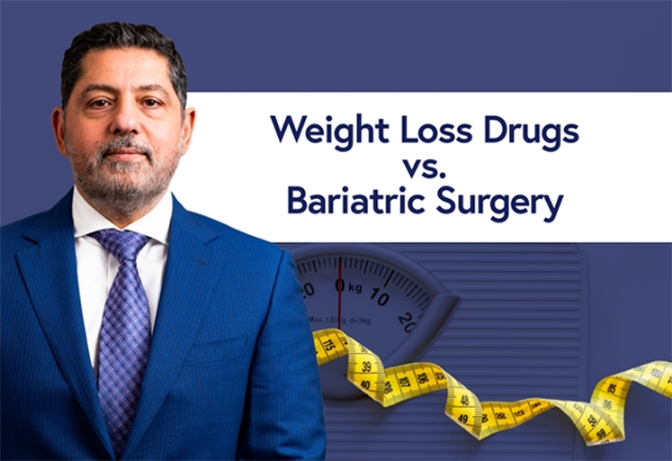Weight Loss Drugs vs. Bariatric Surgery – Which is Right For You?
If you’re trying to lose weight and finding it difficult, you may have considered taking medications or undergoing bariatric surgery. Both of these... read more
Call Us Today (732) 640-5316
E-Waiting Room
Are you frustrated with your inability to lose weight? Tired of being trapped in an endless cycle of yo-yo dieting, over-exercising, cleanses, and calorie counting?
You’re not alone — an estimated 160 million Americans are either obese or overweight. That’s over 30% of the United States population!
The good news is, there are proven methods to help you lose weight and keep it off. Bariatric surgery is recognized by the National Institute of Health (NIH) as the most effective treatment to combat severe obesity and maintain long-term weight loss.
Gastric sleeve surgery is the most popular form of weight loss surgery available today. Let’s take a look at four ways gastric sleeve surgery can change your life for the better.
It’s not all in your head — dieting to lose weight doesn’t work. In fact, people who are affected by severe obesity are resistant to long-term weight loss from diet and exercise alone. In the long run, restricting calories doesn’t make a difference for weight loss.
Gastric sleeve surgery, also known as a sleeve gastrectomy, affects the body differently than diet and exercise. During the procedure, around 80% of the stomach is removed, leaving a “sleeve” about the size of a banana. A smaller stomach means you’ll feel full faster and have fewer cravings.
Besides reducing the size of your stomach, gastric sleeve surgery also affects hormone levels in the gastrointestinal tract. The gastric fundus, an area of the stomach that produces ghrelin, the “hunger hormone,” is removed during gastric sleeve surgery.
When your body produces less ghrelin, you feel less hungry. This leads to gastric sleeve patients losing up to 75% of excess weight over a period of two years.
According to the American Society for Metabolic and Bariatric Surgery (ASMBS), bariatric surgeries can resolve obesity-related conditions like high blood pressure, heart disease, and type 2 diabetes, one of the leading causes of preventable death nationwide.
Nearly 90% of patients lowered their blood sugar after gastric sleeve surgery. A reduction in blood sugar levels can improve diabetes-related health problems and eliminate the need for diabetes medication. Losing weight with the gastric sleeve can also reduce the effects of sleep apnea and COPD.
Read more: Misconception: Obesity is only an addiction, similar to alcoholism or drug dependency
Having a smaller stomach after gastric sleeve surgery means you will approach food in a whole new way. Here at Advanced Surgical and Bariatrics, our team of compassionate weight loss experts work with you one-on-one to ensure your long-term success. You’ll learn new eating habits from our nutritionists, stay on track with weekly check-ins, have access to peer support groups, and more.
Food no longer has to be the enemy. After gastric sleeve surgery, we’ll teach you how to use food as a tool to keep you full and satisfied!
Read more: Post-procedure Expectations
Losing weight and being healthier are a few of the ways your life will change for the better after your weight loss procedure. But it’s not only about that. Losing weight (for good) means you’ll be able to do things you never thought possible.
Say goodbye to feeling winded when you go up and down the stairs. Enjoy playing with your kids at their pace, instead of watching from the sidelines. Look in the mirror and love the person you see in front of you.
Ready to find out more about bariatric surgeries like the gastric sleeve? Schedule an appointment with Advanced Surgical and Bariatrics at any of our offices in Marlboro, Hillsboro, Princeton, or Somerset!

Dr. Ragui Sadek is a premier surgeon who established a state-of-the-art and one of the safest bariatric surgery programs in the state. Dr. Sadek has fellowship training in both laparoscopic/bariatric surgery and surgical trauma/critical care, allowing him to safely perform complex surgeries on patients who have been turned down by other practices. As a Clinical Assistant Professor of surgery at RWJ Medical School & the Director of bariatric surgery program at RWJ University Hospital, Dr. Sadek offers a cutting-edge range of laparoscopic, robotic, & bariatric surgical procedures with a complication rate substantially below the national average.
Dr. Sadek is a Clinical Assistant Professor of Surgery at Rutgers-Robert Wood Johnson Medical School and a Fellow of the American College of Surgeons. Having performed more than three thousand advanced surgical procedures, Dr. Sadek has established a strong patient satisfaction rate and a solid reputation among the surgical community and is renowned as a top physician in his field by International Association of Healthcare Professionals. As a board-certified surgeon, he holds affiliations with the American Society of Metabolic and Bariatric Surgery and the Society of American Gastro Endoscopic Surgeons. More about Dr. Sadek
Stay current with Advanced Surgical & Bariatrics of New Jersey

If you’re trying to lose weight and finding it difficult, you may have considered taking medications or undergoing bariatric surgery. Both of these... read more

Are you frustrated with your inability to lose weight? Tired of being trapped in an endless cycle of yo-yo dieting, over-exercising, cleanses, and... read more